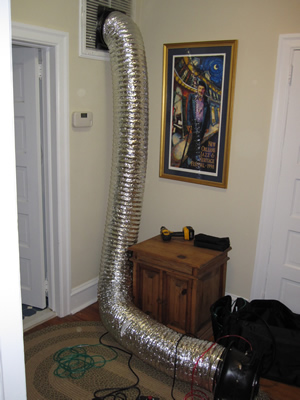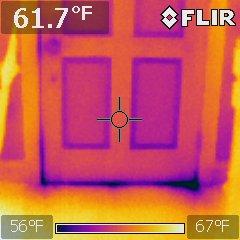What to Expect?
What is an energy audit?
"A home energy audit is a service where the energy efficiency of a house is evaluated by a person using professional equipment (such as blower doors and infra-red cameras), with the aim to suggest the best ways to improve energy efficiency in heating and cooling the house.
An energy audit of a home may involve recording various characteristics of the building envelope including the walls, ceilings, floors, doors, windows, and skylights. For each of these components the area and resistance to heat flow (R-value) is measured or estimated. The leakage rate or infiltration of air through the building envelope is of concern which are strongly affected by window construction and quality of door seals such as weatherstripping. The goal of this exercise is to quantify the building's overall thermal performance. The audit may also assess the efficiency, physical condition, and programming of mechanical systems such as the heating, ventilation, air conditioning equipment, and thermostat." (from Wikipedia)
You can also find information about energy auditing at the Lawrence Berkeley National Laboratory website where they discuss energy auditing, tools used, and benefits of having an audit performed.
Is your Auditor certified?
There are several different "certifications" available to professionals performing energy audits. The two most widely accepted certifications are issued by the following organizations:
Building Performance Institute
Residential Energy Services Network
Generally speaking, a professional performing energy auditing or surveying services will be certified or trained by one or both of the organizations indicated above. These certification training programs are quite rigorous and require both classroom and field testing. Both organizations have technical, professional, and ethical standards by which certified auditors must practice.
BPI certifies "Professional Building Analysts" while RESNET certifies "Raters". The term auditor is used herein as a general term covering both certifications.
The auditor you choose should have a certification number that is verifiable by the appropriate organization.
Is your Auditor insured?
Your auditor should carry a General Commercial Liability policy, at a minimum. They should be able to provide you with a certificate of insurance if you wish.
RESNET requires Raters to carry Professional Liability (errors and omissions) coverage as well as General Liability. You should be able to receive a copy of both coverages.
We carry both General Liability and Professional Liability coverage.
Is your Auditor independent?
You may be tempted to accept a "free" energy audit from the local HVAC or window contractor. While these audits may offer valuable information, they may tend to be biased regarding recommendations for improvements to your house.
Lowry EcoSolutions is an independent service provider and has no ties to any other firm or contractor. Recommendations that we provide will be based solely on the basis of our investigation. We receive compensation only from you, our client.
Contract?
We do ALL work under a written contract. Frequently this contract is in the form of an email, but if you prefer, we can provide you with a proposal letter that lays out all of the services proposed, when we will provide them, what final documentation we will provide, and how much these services will cost you.
What is the process?
An energy audit of your house will begin with a discussion between you and your auditor. Issues that will be covered include:
- Energy bills
- Comfort levels within various parts of the house
- Air quality concerns including carbon monoxide, mold or other contaminants
- Moisture problems
- Heating and cooling equipment questions
- Insulation, windows, doors, and other physical aspects
The auditor will then explain the process by which they will audit your house. This will include some or all of the following:
- An initial walk-through with you in order to discuss and understand your concerns. Your auditor will ask questions about appliances, heating and cooling equipment, doors and windows, landscaping, stormwater runoff concerns, among other things.
- Your auditor will want to look at all areas of your house, so you should make sure access is available to your attic and crawl space, as well as all heating and cooling equipment.
- Many auditors will carry personal carbon monoxide (CO) detectors with them during the energy audit. These devices detect low levels of CO. Please discuss this important topic with your energy auditor and refer to our section on Carbon Monoxide for additional information. It is critically important that homeowners understand the basics of carbon monoxide poisoning and what can be done to protect your family.
- Your auditor may also be performing diagnostic testing of your combustion appliances, also known as your gas/oil heater, gas hot water heater, and gas oven. Testing will check for levels of carbon monoxide, draft, spillage, and efficiency. This testing will likely be performed under a "worst case depressurization" condition. This simply means that your auditor will "depressurize" your house by turning on all of your fans. This is done in an attempt to compete with the flue draft of your heater and hot water heater and to see if your systems function properly and safely when all of your fans are turned on.
- Your auditor will run a 'blower door test' which will put your house under a vacuum of approximately 50 pascals, or about the equivalent of a 20 mile per hour wind against the side of your house. Putting your house under this vacuum will make it very obvious where the air leaks are. Air leaks are a major cause of heat loss out of your house (during the winter), or heat gain into your house (during the summer). There may be reasons why a blower door test is not performed such as possible asbestos or mold in the house. The blower door test could move these contaminants around the house so your energy auditor should discuss these issues with you and may not perform the test to avoid creating a health problem.
- Your auditor may also test your duct systems using another small fan. This test indicates how leaky your duct system is and may help pinpoint leak locations.

- An infrared camera may also be used to locate air leaks and possibly moisture problems. The infrared camera "sees" heat rather than the visible light that you and we see. Note the dark areas in the photo below. These are areas where cold outside air is leaking into the house. Or more correctly, areas where warm inside air is escaping to the outside.
- Generally, an audit will take around 3 to 4 hours depending on the size of the house and the testing performed.
What do you need to do in advance?
The auditor will want copies of your most recent utility bills including electricity, gas, oil, and water. They will use these bills to gain an understanding of your seasonal utility usage and how your home functions.
You will want to be present when the auditor is testing your house in order to answer questions that arise. However, the auditor will spend most of their time making observations and recording test data, so they will be quite busy.
You may also want to keep cats or dogs in a confined room or crate so they don't become too helpful to the auditor. It is also fine for children to be in the house, but they shouldn't be allowed to 'assist' the auditor while performing their observations and testing.
What are the results and how do I use them?
You will receive a report that will typically contain the following:
- Combustion appliance testing results (draft, carbon monoxide, efficiency, gas leaks)
- Blower door testing results (air leakiness)
- Duct leakage testing results
- Physical observations (appliance condition, insulation, door/windows, moisture)
- Recommendations regarding safety, comfort, and energy efficiency improvements
The auditor will discuss their findings at the completion of the audit, but may also offer suggestions or recommendations in the report.
Report and Recommendations
Included with the recommendations from your auditor will likely be suggestions for contractors to perform insulation and air sealing, heating equipment maintenance or replacement, window repair or replacement, among other trades. These suggestions are for your consideration as you may have a relationship with a contractor already.
Your auditor is here to help you and will try to answer any questions you have.

